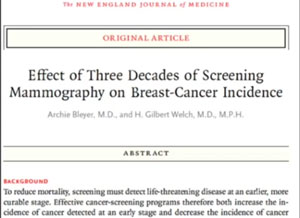 Screening Mammography is in the News Again! Published in the New England Journal of Medicine, “Effect of Three Decades of Screening Mammography on Breast Cancer Incidence,” by H. Gilbert Welch, Ph.D, and Archie Bleyer, Ph.D, this new research review shows that screening mammography only increases the amount of early-stage cancers detected and has not decreased the number of late-stage cancers found, as one would hope. Instead of saving lives, it causes more than one million women to be treated for a disease that they never would have died from.
Screening Mammography is in the News Again! Published in the New England Journal of Medicine, “Effect of Three Decades of Screening Mammography on Breast Cancer Incidence,” by H. Gilbert Welch, Ph.D, and Archie Bleyer, Ph.D, this new research review shows that screening mammography only increases the amount of early-stage cancers detected and has not decreased the number of late-stage cancers found, as one would hope. Instead of saving lives, it causes more than one million women to be treated for a disease that they never would have died from.
As an 18-year veteran of breast cancer survivorship, I resolved long ago that I can be a part of the solution or a part of continuing the problem. There are so many people out there who are promoting myths. In my own personal breast cancer advocacy work, I knew that before I sent a message, I wanted to make sure what I said was factually correct. When I was first diagnosed with breast cancer I was told: “Early Detection Saves Lives.” I believed it at first, until some of my friends started to die of the disease and I noticed some of them were diagnosed with smaller tumors and had a better prognosis than my own. I began to better educate myself about what that statement about early detection meant and realized in our zest to say something empowering and helpful, we have perpetuated a myth.
This new research by Welch and Bleyer raises serious concerns about the value of screening mammography and clarifies that the effect on mortality rate is likely smaller, with the harm of overdiagnosis likely larger, than previously recognized. This study is only related to screening and not diagnostic mammograms, where a woman (or man) has a mammogram to investigate whether an existing lump is cause for concern. There is no debate about the usefulness of diagnostic mammograms.
Welch, from Dartmouth University, has explained his research findings in an easy-to-understand video. Please watch it!
One must consider the fact that there is an extraordinary cost to treating more than a million women for breast cancer. Surgery, chemotherapy and radiation all cost a woman very much in her life. They lose body parts, they are exposed to toxic chemicals and treatments, and they lose time with their family, from their job and doing all of the things they love best, while undergoing treatment. They are put at risk for other diseases, as Robin Roberts was when she contracted myelodysplastic syndrome (MDS) after breast cancer treatment. Some lose their jobs as a result of debilitating treatments. Chemotherapy robs others of their fertility or sexual function. Some women die from side effects of their treatment. There is a cost to the treatment for breast cancer.
This research reinforces how important it is that we be a part of the solution and that solution involves moving beyond the search for early detection and moving into the cure for breast cancer. Sign the petition to show that you believe we need to solve the real problem of breast cancer and that you would like the President of the United States to take a leadership position in helping us to end breast cancer.
In November of 2009, YSC responded to the U.S. Preventive Services Task Force's then newly released recommendations on screening mammography. To learn more, read YSC’s statement.



